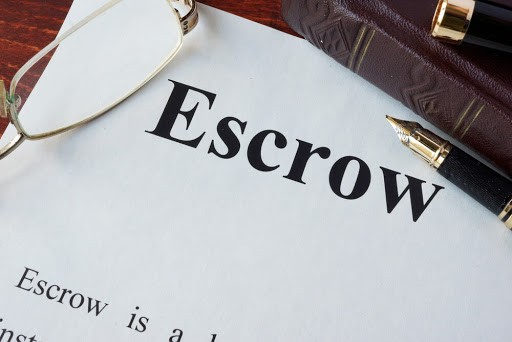Blog Detail
Guide To Escrow Services

An Escrow is a bond, a deed, or other documents that are kept under the supervision of a third party and taking effect only when a specified condition has been fulfilled. In simple words, escrow services are third-party arrangements where two parties that are in the process of completing a transaction appoint a third party to hold their money, paperwork, and other assets temporarily until the contractual obligations are met.
1. The third party holds the assets or funds on behalf of both parties before they are transferred from one party to another.
2. The third-party is entitled to release the funds only after both parties have fulfilled the T&C of the contract.
3. Escrow services are usually used in real estate transactions, but it is also applicable where funds are involved between two parties.
Escrow services make the transactions more secure & feasible for both parties. Since the asset is secured within an escrow account, it assures buyers that the seller will get the payment only after when goods or services arrive, while the sellers are assured of getting on-time payment as a neutral & legal third party is holding the funds on their behalf.
How does an Escrow Account work?
In the course of a real estate transaction, the escrow officer (a lawyer or title company representative) takes care of all the necessary documents and deposits while the buyer and the seller work out the details. One of the most important duties of the escrow officer is to ensure that the transaction ends well and all the contractual obligations are paid. This includes the fees charged by the escrow officer that varies as per the cost of the assets being held. After the execution, the escrow officer is required to record the deed and title transfer that makes the buyer the real owner of the asset.
This is how an escrow account works:
1. Both buyers & sellers agree to enter into a transaction.
2. The buyer pays the third party for opening an escrow account through an approved payment method.
3. The third-party verifies the payment and instructs the seller to send the merchandise and submit evidential documents.
4. The escrow account holder verifies regarding receiving merchandise with an option to accept or reject. In case of rejection, the buyer is authorized to raise a dispute. But if accepted, the third party releases the funds to the sellers from the escrow account.
Recommended Read: Are escrow solutions right for your small business?
Types of escrows
Escrow accounts are useful in the following situations:
1. Buying & Selling a Home (Real Estate Escrow) - It is one of the most common types of escrow accounts where earnest money is deposited into the account to protect both buyers and sellers of real estate. But why? The buyer is required to deposit earnest money to sellers while entering into a buying agreement to show his seriousness for buying. But due to a lack of trust between parties, an escrow account is created. It allows the seller to receive the funds in case the buyer backs out while on the other hand, the buyer has peace of mind to get the money back in the event of contingencies. This deposited money acts as insurance for the real estate company that the money will not be used for other reasons. The money is refunded only in case of emergencies.
2. Monthly Payments (Mortgage Escrow) - A mortgage escrow account is an agreement between a buyer and a mortgage lender to ensure timely payments of property tax bills, homeowner’s insurance, and private mortgage insurance, etc. Lenders use this account to avoid the risk of borrowers failing to pay taxes and insurance bills. Here, the homeowners can initiate these monthly payments to the escrow account and both borrowers and lenders can be protected. How? With each monthly payment, the amount for your loan balance, taxes, or insurance goes into the account until annual bills come due. Plus, it also helps with dividing larger annual expenses into small pieces to make them less burdensome. By dividing the payments, there is no need for urgent funds when a semi-annual or annual bill arrives.
3. Renters Escrow - These types of escrow accounts are used in security deposits and to avoid conflicts & disputes between landlord & renter. How? Some states require tenants to deposit a certain amount of money to landlords in an escrow account ensuring that they can get their money back. Tenants may also take action against landlords to receive compensation in case the landlord fails to repair or other housing needs. Plus, the renters can also withhold the rent payments if landlords fail to address renter needs.
4. Private Capital Market Transactions - Creating an escrow account is also common in some private placements or Mergers & acquisitions where one company seeks to get full or partial equity stakes in other companies. Before the deal is closed or payment is made, an escrow account is created where the money lies until the terms & conditions of the contract are met by both parties.
5. Construction Escrow - It is one of the least types of escrow accounts that are used by construction professionals when there is a loan involved for remodeling or constructing any house. This is how it works. The contractor mentions the stages of construction and the time of completion with an estimated cost. Then, the bank deposits their payment as the job is done and a third party puts them into escrow for the contractor.
6. Online Transactions - Escrow accounts can be used to provide security to both buyers and sellers in almost any type of transaction. For example, online wallets while buying or selling online. Here both the parties are unknown to each other and thereby some online services offer escrow duties for you.
7. Cross-border Trade Escrow Account - Having an escrow account for cross-border trade is a simple, and hassle-free way for both importers & exporters to perform a transaction. In the process, the importer deposits the agreed amount to the escrow account and when the payment is verified by the escrow service providers, the exporters are instructed to ship the goods. The payment is made to the exporters as per the predetermined T&C, for example, upon shipment, upon delivery, or after a particular day's post-shipment or delivery.
8. Cash & Document Escrow Account - These types of escrow services are offered by large banks and financial institutions when high-value transactions are involved. For example, when the two companies are involved in Mergers & Acquisitions etc. Banks and FIs hold the money or other documents on behalf of the parties to the contract until the contract is fulfilled by the stakeholders. After the contract is complete, the bank releases the money or documents to their destination accounts.
Benefits of an escrow account
An escrow account has many benefits. A few of them are listed below:
1. Stress-free Transaction - The very first and foremost benefit of having an escrow account is that both parties can execute stress-free transactions. If an agreement falls through for any reason, the buyer will get the earnest money payment from the escrow account holder. The seller will not be paid until the arrived merchandise has been accepted and terms are met. On the other hand, the seller is assured of getting paid for the rendered services even if the buyer defaults.
2. Asset Protection- Escrow account eliminates the risk of payment & performance failure by holding the concerning asset on behalf of the contracting parties until the contractual obligations are met. The parties are assured that the funds are protected by a legal third party. It is a perfect way of safeguarding the money while a transaction is in process.
3. Cost-effective - The charges and costs for escrow account services vary depending on the concerning assets that are being held by the parties. Generally, the fee for the service ranges between 1 to 2 percent. So it has been advised to compare different prices and services and then select the best.
Escrow accounts provide a lot of conveniences. It can help in getting low credit rates in banks and also provides a payment surety to both the buyer & seller. The seller is paid only if the buyer inspects and accepts the merchandise. On the other hand, it also benefits the seller as the goods are shipped only when the funds provided by the buyer are verified and authorized by the escrow account holder. Shipping and exporting goods are full of risks and uncertainties but escrow accounts can help in reducing or eliminating these risks.
The funds involved in a transaction are completely safeguarded and secure with escrow accounts.
How to choose a perfect escrow agent for you?
Choosing the right escrow company is critical to ensure that the money or any concerning the property is safe and being handled by a professional & reliable escrow agent. It deserves a constructive amount of time & research, otherwise, it could lead to uncertainty in a transaction.
Luckily, many important factors can be considered before hiring an escrow officer. For example,
1. Experience & reputation of the escrow company.
2. Stability and financial strength of the escrow service provider
3. Fee for escrow services etc.
4. Location of the company
5. Discuss the escrow process
These are some of the most essential factors to keep in mind while choosing the escrow agent.
You may follow the below-mentioned procedure for this:
1. Ask for a list of escrow costs and titles. Make sure that it is provided by the lender too while purchasing.
2. Identify if the buyer or the seller pays the fees.
3. If the initial offer is low, then go for looking at incidental fees such as wire transfers, courier fees, and fax fees, and copying. And these fees must be revealed on one’s initial estimate of fees.
What are the duties of an escrow agent?
As mentioned above, escrow services introduce a neutral third-party agent that holds and controls specified documents in the process of a healthy transaction and executes those documents only when certain terms and conditions are met by both parties. But the duties of a good escrow agent do not end here only. Here they are as follows:
1. Managing and taking care of all the financing, title and escrow things, transaction instruction, and all the other paperwork associated with the mortgage refinance, home purchase, and other title transfer to enable a smooth transaction.
2. Protecting and safeguarding the required documents, securing the process, and verifying their security & safety.
3. Making sure that the parties’ obligations are clear and fulfilled within the stipulated amount of time.
4. Disbursing funds to the seller and delivering the deed to the buyer after a transaction is closed. This is known as “close of escrow” ie. The transaction is complete now.
Escrow account fees
Fees for availing escrow services vary differently. But commonly, an escrow agent will demand 1% of the home sales price for managing and controlling the escrow account. The fee is required to be paid at the time of home sale closing. Both the seller and the buyer can even negotiate the fee.
Once the home has been sold out, then the new homeowner has to ensure that his or her escrow account has enough amounts to pay out the previous homeowner’s insurance payments and property taxes. The homeowner must ensure that the mortgage lender makes the required payments directly and on a timely basis.







